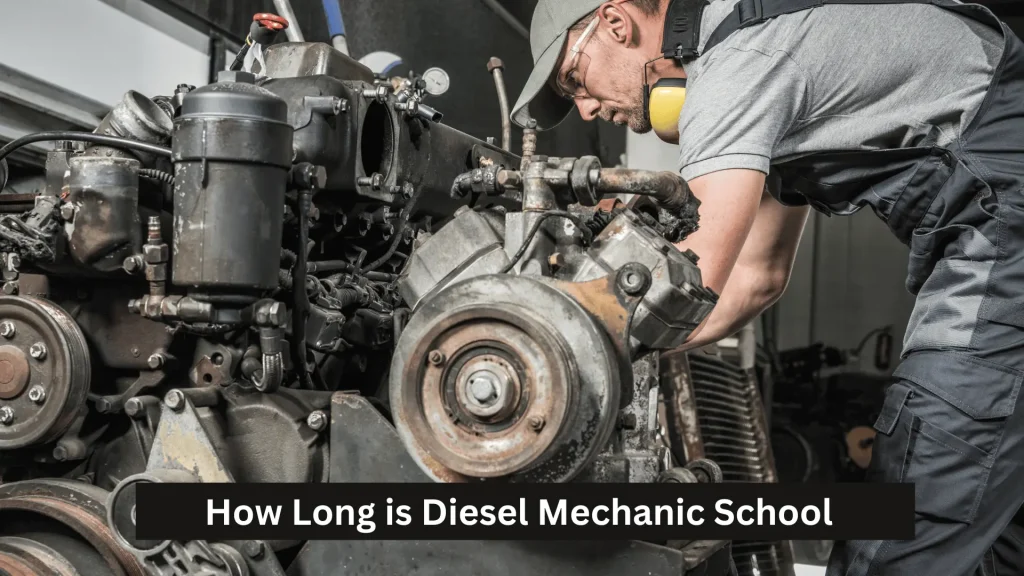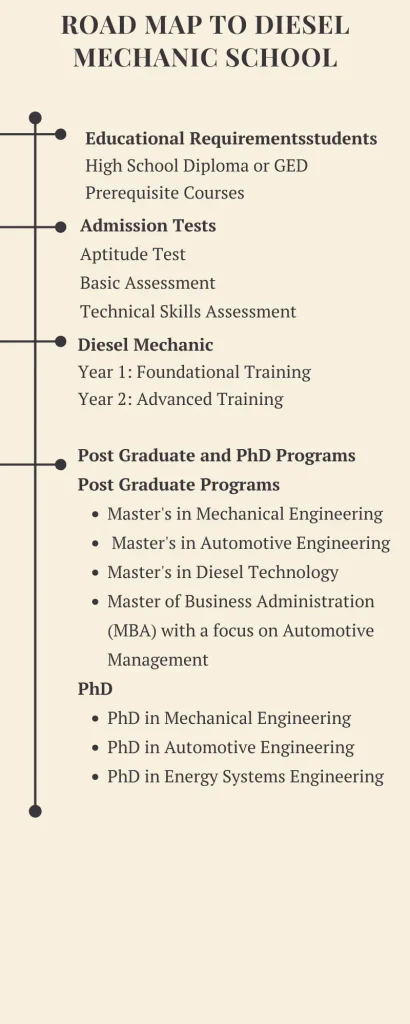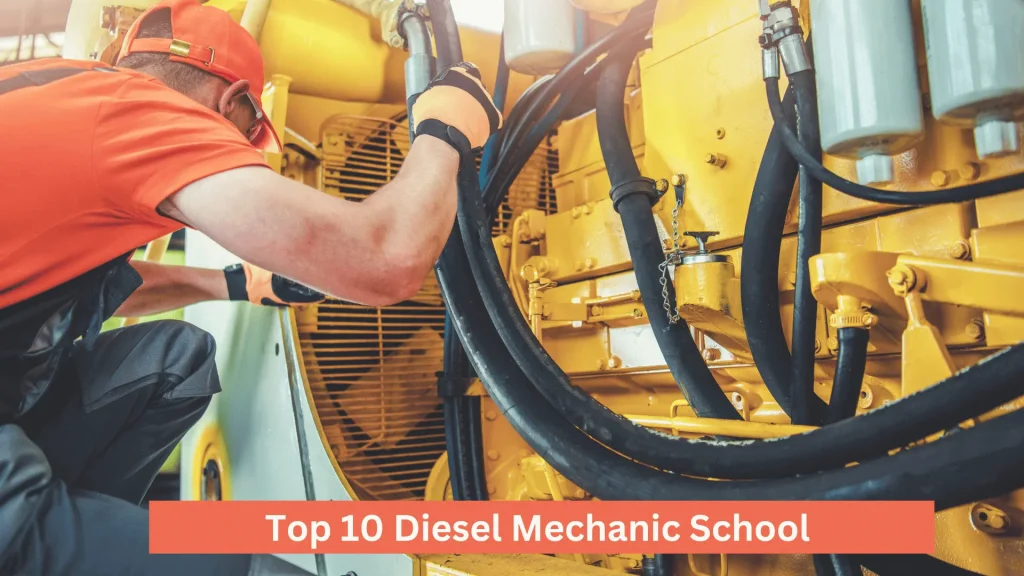How Long is Diesel Mechanic School? Typically, diesel mechanic programs can range from 6 months to 2 years, depending on whether you pursue a certificate, diploma, or associate degree. The duration varies based on the curriculum and whether you attend full-time or part-time.
What is Diesel Mechanic School
Diesel mechanic school provides specialized training for individuals interested in maintaining and repairing diesel engines. These schools offer a mix of classroom instruction and hands-on experience. Students learn about engine systems, diagnostics, and repair techniques. The curriculum often includes courses on safety, tools, and technology used in the diesel industry.

In addition to technical skills, diesel mechanic schools also teach students critical problem-solving abilities and the importance of preventative maintenance. Graduates are prepared to work in various settings, such as truck repair shops, fleet maintenance facilities, and equipment dealerships. This training ensures they can handle the complexities of modern diesel engines and systems.
How Long is Diesel Mechanic School
Year 1: Foundational Training
- Introduction to Diesel Technology: Students learn the basics of diesel engines, industry standards, and safety protocols.
- Tools and Equipment: Training on the proper use of tools and diagnostic equipment essential for diesel mechanics.
- Basic Engine Systems: Courses cover fundamental engine components and systems, including fuel, air intake, and exhaust systems.
- Electrical Systems: Introduction to basic electrical concepts and wiring diagrams relevant to diesel engines.
- Preventative Maintenance: Focus on routine maintenance procedures to ensure engine longevity and performance.
Year 2: Advanced Training and Specialization
- Advanced Engine Diagnostics: In-depth training on diagnosing and troubleshooting complex engine issues using advanced diagnostic tools.
- Hydraulics and Pneumatics: Study of hydraulic and pneumatic systems used in heavy equipment and machinery.
- Transmission and Drivetrain Systems: Detailed examination of transmission systems, clutches, and drivetrains.
- Emissions and Environmental Standards: Courses on emissions control systems and adherence to environmental regulations.
- Internship/Practicum: Hands-on experience through internships or practical training in real-world settings, allowing students to apply their skills and gain practical insights.
- Capstone Project: A comprehensive project that integrates the knowledge and skills acquired throughout the program, often involving the diagnosis and repair of a diesel engine.
By the end of the two-year program, students will have gained a robust understanding of diesel technology, equipped with both theoretical knowledge and practical skills essential for a successful career as a diesel mechanic.

How to Enter Diesel Mechanic School
Educational Requirements for Diesel Mechanic School
- High School Diploma or GED: Completion of high school or equivalent.
- Prerequisite Courses: Basic math, science, and technical skills.
- Physical Requirements: Ability to perform physically demanding tasks.
Entry Tests
- Aptitude Tests: Some schools may require an aptitude test to assess mechanical skills and knowledge.
- Technical Skills Assessment: Evaluation of basic technical skills relevant to diesel mechanics.
Application Process
- Application Form: Complete the school’s application form, available online or at the admissions office.
- Transcripts: Submit high school transcripts or GED scores.
- Letters of Recommendation: Provide letters from teachers or employers.
- Personal Statement: Write a personal statement outlining your interest in diesel mechanics.
Financial Aids
- Scholarships: Many schools offer scholarships based on merit or financial need.
- Grants: Federal and state grants may be available for eligible students.
- Student Loans: Options for federal or private student loans.
- Work-Study Programs: Opportunities to work part-time while attending school to help cover expenses.
- Veteran Benefits: Financial aid options for military veterans.
Post Graduate and PhD Programs for Diesel Mechanic School
Postgraduate and PhD programs for diesel mechanics are less common compared to other fields, but they do exist, primarily focusing on advanced engineering, research, and management aspects related to diesel technology and mechanical engineering. Here are some potential pathways and programs that one might pursue:
Postgraduate Programs
Master’s in Mechanical Engineering:
- Focuses on advanced mechanical engineering concepts, including diesel engine technology.
- Courses may cover topics such as thermodynamics, fluid mechanics, and advanced materials.
- Often includes research projects or a thesis related to diesel engines or automotive engineering.
Master’s in Automotive Engineering:
- Specializes in the design, development, and testing of vehicles, including diesel-powered systems.
- Includes coursework on vehicle dynamics, engine technology, and alternative fuel systems.
- May involve internships or industry collaborations.
Master’s in Diesel Technology:
- Focuses specifically on diesel engine systems, diagnostics, and repair.
- Includes advanced training in diesel fuel systems, emissions control, and engine performance.
- Often involves hands-on laboratory work and practical experience.
Master of Business Administration (MBA) with a focus on Automotive Management:
- Combines business management skills with specialized knowledge in the automotive industry.
- Covers topics like supply chain management, operations, and strategic planning.
- Suitable for those aiming for leadership or managerial roles in the diesel mechanic industry.
PhD Programs
PhD in Mechanical Engineering:
- Involves advanced research in mechanical engineering, with opportunities to specialize in diesel technology.
- Requires original research and the completion of a dissertation on a topic related to diesel engines or related systems.
- Prepares graduates for careers in academia, research, and high-level engineering positions.
PhD in Automotive Engineering:
- Focuses on advanced research in vehicle technology, including diesel engines.
- Involves extensive laboratory work, experimentation, and theoretical studies.
- Graduates may work in research and development, academia, or advanced engineering roles in the automotive industry.
PhD in Energy Systems Engineering:
- Explores advanced topics in energy production, efficiency, and sustainability, including diesel engine technologies.
- Research may focus on alternative fuels, emissions control, and energy optimization in diesel engines.
- Prepares graduates for careers in research, policy development, and advanced engineering roles.
Top 10 Diesel Mechanic Schools
Choosing a top diesel mechanic school can significantly impact your career prospects and education quality. Here is a list of ten renowned diesel mechanic schools in the United States, based on their curriculum, facilities, industry connections, and student outcomes:

1. University of Northwestern Ohio (UNOH)
- Location: Lima, Ohio
- Program: Associate Degree and Diploma in Diesel Technology
- Highlights: Extensive hands-on training, state-of-the-art facilities, industry partnerships, and strong job placement rates.
2. Wyoming Technical Institute (WyoTech)
- Location: Laramie, Wyoming
- Program: Diesel Technology Program
- Highlights: Comprehensive curriculum, hands-on training, and specialized programs in diesel technology and advanced diesel systems.
3. Universal Technical Institute (UTI)
- Location: Multiple campuses nationwide
- Program: Diesel Technology Program
- Highlights: Nationwide presence, partnerships with leading diesel manufacturers, and opportunities for manufacturer-specific advanced training.
4. Lincoln Tech
- Location: Multiple campuses nationwide
- Program: Diesel and Truck Technology Program
- Highlights: Experienced faculty, hands-on training, and partnerships with industry leaders like Cummins and Caterpillar.
5. Ohio Technical College (OTC)
- Location: Cleveland, Ohio
- Program: Diesel Equipment Technology Program
- Highlights: Comprehensive curriculum, hands-on training, and opportunities for specialization in areas like hydraulics and powertrains.
6. Nashville Auto-Diesel College (NADC)
- Location: Nashville, Tennessee
- Program: Diesel Technology Program
- Highlights: Long-standing reputation, hands-on training, and strong industry connections.
7. Pennsylvania College of Technology (Penn College)
- Location: Williamsport, Pennsylvania
- Program: Associate Degree in Diesel Technology
- Highlights: Advanced facilities, hands-on training, and a strong focus on industry standards and practices.
8. University of Alaska Southeast (UAS)
- Location: Juneau, Alaska
- Program: Associate of Applied Science in Diesel Power Technology
- Highlights: Unique training environment, focus on diesel technology in harsh climates, and strong industry ties.
9. Salt Lake Community College (SLCC)
- Location: Salt Lake City, Utah
- Program: Associate Degree in Diesel Systems Technology
- Highlights: Affordable tuition, comprehensive curriculum, and strong job placement support.
10. San Jacinto College
- Location: Pasadena, Texas
- Program: Diesel Technology Program
- Highlights: Modern facilities, experienced faculty, and strong industry connections with local
Factors Affecting the Length of Diesel Mechanic School
Program Type
Certificate Programs: Typically last 6 months to 1 year, focusing on basic skills and knowledge.
Diploma Programs: Usually 1 year long, offering more in-depth training.
Associate Degree Programs: Generally 2 years, combining technical training with general education courses.
Enrollment Status
Full-Time: Allows students to complete the program in the shortest possible time, following a regular schedule.
Part-Time: Extends the program duration as students take fewer courses each semester.
Curriculum Complexity
Basic Programs: Cover essential topics and may be shorter.
Advanced Programs: Include specialized courses and extensive hands-on training, which can lengthen the program duration.
School Schedule
Accelerated Programs: Offer condensed schedules, enabling faster completion.
Traditional Programs: Follow a standard academic calendar, often extending over two years
for associate degrees.
Internships and Practicums
Required Internships: Provide valuable hands-on experience but can add to the program length.
Optional Practicums: Offer additional experience opportunities, potentially extending the overall time to complete the program.
Final Verdict
Pursuing a career in diesel mechanics involves understanding the educational paths, program lengths, and factors influencing training duration. With top schools offering comprehensive programs, aspiring diesel mechanics can choose the best fit to gain the necessary skills for a successful career.
FAQs
1.How long is diesel mechanic school?
Diesel mechanic programs typically range from 6 months to 2 years, depending on the type of credential.
2.What are the educational requirements to enroll in diesel mechanic school?
A high school diploma or GED, along with basic math and science skills, is generally required.
3.Are there advanced degrees available in diesel mechanics?
While rare, postgraduate and PhD programs are available in related fields like automotive or mechanical engineering.
4.What financial aid options are available for diesel mechanic students?
Scholarships, grants, student loans, work-study programs, and veteran benefits are common financial aid options.
5.Which are the top diesel mechanic schools?
Leading schools include Universal Technical Institute, Wyotech, Lincoln Tech, and Pennsylvania College of Technology.
